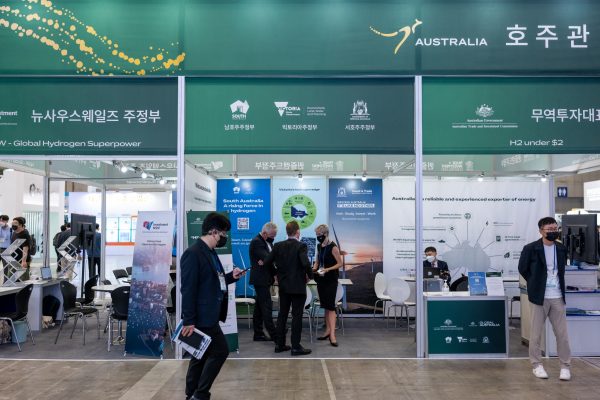This dynamic has been changing over the last six years. Under the former Moon Jae-in administration, South Korea made clear that it intended to reduce its use of fossil fuels and nuclear energy while increasing its use of renewable energy sources. The government committed itself to a target of 20 per cent energy generation from renewables by 2030, 35 per cent by 2040 and net zero by 2050.
In the pursuit of ‘Green Growth’, a national strategy to create sustainable growth engines, Seoul sees the ‘right mix of energy’ as an opportunity to build the green industries of the future. But in July 2022, South Korean President Yoon Suk-yeol officially reversed the Moon government’s aim to limit nuclear energy to 10.1 per cent of the energy mix by 2034.
Yoon then reinstated the export of nuclear power reactors as a national growth industry, seeking to increase South Korea’s share of nuclear energy power generation from 27.1 per cent in 2021 to 30 per cent by 2030. But the extent to which the current government will fully realise its nuclear energy ambitions is far from clear given various geostrategic considerations — not least China’s rise as a green technology leader — and domestic political challenges.
Yoon will also need to honour the previous government’s commitment to carbon neutrality by 2050, codified into law in March 2022 through the ‘Carbon Neutrality Act’. The new government has re-emphasised South Korea’s appetite for a ‘hydrogen economy’— a fuel that could help achieve decarbonisation objectives if developed using renewables as opposed to fossil fuels.
Seoul’s net-zero emissions targets will effectively shut down some Australian fossil fuel exports, notably coal, in the medium term. Australian-sourced liquefied natural gas will be increasingly used as a ‘bridging fuel’ in the transition to a more renewables-heavy future. That gives Australia an enormous opportunity to supply green hydrogen to South Korea and for the two countries to cooperate in developing and commercialising new renewable technologies.
There has been an explosion of bilateral initiatives between South Korea and Australia over the last three years. Things kicked off in August 2020 with the signing of a memorandum of understanding between Hyundai Motor Company, the Commonwealth Scientific and Industrial Research Organisation (CSIRO) and Fortescue Metals Group to develop green hydrogen production technologies.
Another memorandum was signed by Australia’s Origin Energy and South Korea’s POSCO in May 2021 to trial green hydrogen in steel manufacturing. In November 2021, the Australian Renewable Energy Agency announced its decision to fund Ark Energy, a subsidiary of Korea Zinc, to deploy green hydrogen storage and refuelling infrastructure. The project provided green hydrogen to five 140-tonne fuel cell electric vehicle trucks at a zinc refinery operated by its sister company, Sun Metals.
While these cooperative projects hold much promise in realising South Korea and Australia’s new era of energy cooperation, Seoul could provide Australian government agencies and industries with greater certainty about their long-term energy policy. It does not help that South Korea’s single five-year presidential term limit can sometimes dramatically impact the direction of national policies in certain issue areas and sectors.
South Korean corporate players should focus more on concrete outcomes like their Japanese competitors. Kawasaki Heavy Industries pioneered the world’s first successful commercial transportation of liquefied hydrogen between Japan and Australia in January 2022.
On the Australian side, the federal government could help galvanise investment in green industries through a stronger focus on ‘picking winners’ and departing from the ‘technology neutral’ approach championed by the Morrison government. Such thinking was evident in the 2019 Australian National Hydrogen Strategy and 2020 Technology Investment Roadmap, which targeted green projects such as renewable hydrogen and so-called ‘cleaner fossil fuels’ such as coal and gas-derived hydrogen.
Without a strategy to shift away from fossil fuel projects, the Australian government’s technology-neutral approach diverts resources away from green industries, hurting its increasingly narrow lead in hydrogen. This approach could compromise the long-term cooperation of South Korean customers desperately seeking solutions to decarbonise their industrial sectors.
How long Australia can sustain its lead in green hydrogen will also depend on Canberra’s ability to induce the cooperation of large industry players, smaller companies and state agencies. Australia could learn a lesson from South Korean counterparts such as H2Korea, a state-backed public–private entity responsible for organising hydrogen technology development initiatives, exports and bilateral cooperation with foreign governments and industry players.
The success of H2Korea in developing sophisticated links between private companies and government agencies across the industrial value chain affirms the importance of creating hybridised industrial ecosystems to drive the growth of high-technology industries such as green energy. Yet no comparable body exists in the Australian innovation and production landscape.
While much has been achieved to date, both Seoul and Canberra need to work faster and smarter to seize the full potential of a new era of energy cooperation.
Sung-Young Kim is Senior Lecturer of Politics and International Relations at Macquarie University, Sydney.
The study was funded by the Academy of Korean Studies (AKS-2019-INC-223000X).

